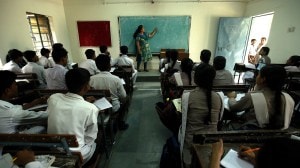Expert Explains | What happens now in Mahua Moitra cash-for-query case: process, precedent
The Ethics Committee of Lok Sabha will meet BJP MP Nishikant Dubey today over his cash-for-query allegation against the TMC's Mahua Moitra. This is what could happen thereafter, as per procedure and precedent.
 TMC MP Mahua Moitra at Parliament House complex, in New Delhi in 2023. (PTI Photo/Kamal Singh)
TMC MP Mahua Moitra at Parliament House complex, in New Delhi in 2023. (PTI Photo/Kamal Singh) BJP MP Nishikant Dubey and lawyer Jai Anant Dehadrai will appear before the Ethics Committee of Lok Sabha at noon on Thursday in connection with Dubey’s accusation, made in a letter to Speaker Om Birla earlier this month, that Trinamool Congress member Mahua Moitra accepted “bribes” to ask questions in Parliament targeting the Adani Group.
The allegations by Dubey, which he has since taken to Union IT Minister Ashwini Vaishnaw and the Lokpal, are based on information provided by Dehadrai, which were confirmed by real estate developer Darshan Hiranandani subsequently. Hiranandani, a resident of Dubai, has issued a “sworn affidavit” saying Moitra gave him her Parliament login and password so he could post questions on her behalf.
How serious is Nishikant Dubey’s accusation?
Essentially, the question is whether an MP is asking a question in return for some consideration, and whether there is illegal gratification involved. If this is established, then it is a serious issue.
If an MP has asked questions and has done other parliamentary work on behalf of somebody who has paid a consideration, then it should actually come to the Privileges Committee because it is a serious breach of privilege and contempt of the House. This is true for all countries that have a parliamentary system. In such a situation, Parliament can exercise its right to expel the member from the House.
So is the Ethics Committee the right forum for a matter such as this?
In my opinion, it should have been referred to the Privileges Committee, which is the only committee with the mandate to look into alleged breaches of privilege and contempt of the House. The Ethics Committee has been dealing only with some [less serious] questions of propriety, etc. — not with cases where there is an alleged breach of privilege. For example, there was a case in which a man took his mistress or girlfriend on an official tour saying she was his wife, and the Ethics Committee looked into it.
But there was another instance in which a man took a woman and a boy abroad on the passports of his wife and child. That was a serious case — and a violation of The Passports Act. A special committee was set up to look into it, and he was expelled from the House. So, for serious matters, there is either the Privileges Committee or a special committee appointed by the House for that particular purpose.
Has there been an allegation earlier about an MP handing over access to the Parliament website to someone else?
No. This system has come into existence recently. As per the rules of Lok Sabha, a Member has to submit a question in a particular form signed by him or her with their identity number. The question can be delivered by someone on the Member’s behalf, but it has to be signed by the Member. The signature is verified and the question is then processed.
Is there a rule that specifically bars Members from giving their Parliament login and password to a third person?
There is no such rule yet — because the practice of online submission of questions is recent. The rule should have been amended when online submissions were allowed. Had there been a rule, some safeguards against violations would have been specified as well.
What will happen once the Committee starts its proceedings on October 26?
The Committee will call the persons who are involved, the stakeholders — the person who made the complaint, the people who made statements, filed affidavits — and take their evidence. After that, the Committee will certainly call the Member against whom the complaint has been made. She has the right to cross-examine the complainant. She can also seek the permission of the Speaker to appear through an advocate, who can cross-examine the other side.
How long could the Committee take to reach a decision and, should they find merit in the complaint, what is the maximum punishment it could recommend?
The time a Committee takes depends on the complexity of the case. In the normal course, two months’ time can be given, and the Committee can seek an extension if needed.
This Committee has in the past recommended the suspension of the Member for a certain period. The Member who had taken his girlfriend on a tour was suspended for 30 sittings. I think the Ethics Committee can only recommend suspension.
Could the Committee refer the matter to an investigative agency like the CBI or police?
No. This (Ethics) Committee does not have that kind of mandate.
Mahua Moitra has pointed out that the Ethics Committee has an “absolute majority of BJP members”.
In all Committees of Parliament, the ruling party will have a majority — that is the way committees are structured. Parliamentary Committees are supposed to function in a non-political manner, rising above party considerations when they examine issues. That has been the tradition, and it is expected that the Committee will address issues in an impartial and objective way.
The Committee does not have executive powers; it cannot punish the Member. Its recommendation will go before the House, which will take a decision. The House can accept the recommendation and agree with the suggested punishment, or perhaps agree with the findings but not with the punishment — it can take a lenient view.
Can the MP appeal a potentially adverse decision in a court of law?
If the Member is expelled, she can challenge it. If there is some illegality or unconstitutionality about the way in which the Committee went about the whole exercise, if there was a total denial of natural justice, in that case she can challenge it — not otherwise.
The window for the court’s view is small. It is unconstitutionality, gross illegality, and denial of natural justice. These are the grounds on which a challenge can be mounted.
PDT Achary was Secretary General of the 14th and 15th Lok Sabhas. He is one of India’s most eminent experts on parliamentary procedure. He spoke to Manoj CG.
- 01
- 02
- 03
- 04
- 05






































